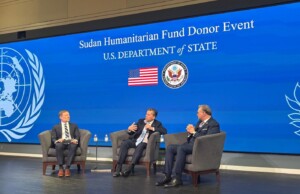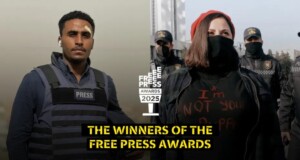Minister: We do not want the government or one party to control Sudan’s media
Sudan’s Minister of Information, Culture, and Tourism, Faisal Mohamed Saleh, has said that the transformation of Sudan’s media to a democratic system is “a long journey”. He also praised the work of Radio Dabanga over the past 11 years.
 Sudan’s Minister of Information, Culture, and Tourism, Faisal Mohamed Saleh (RD)
Sudan’s Minister of Information, Culture, and Tourism, Faisal Mohamed Saleh (RD)
Sudan’s Minister of Information, Culture, and Tourism, Faisal Mohamed Saleh, has said that the transformation of Sudan’s media to a democratic system is “a long journey”. He also praised the work of Radio Dabanga over the past 11 years.
“I witnessed the popularity of Radio Dabanga in Darfur and other regions of Sudan and I think Radio Dabanga still has a role to play”, the minister said in a meeting with Radio Dabanga editor-in-chief Kamal El Sadig in Khartoum.
The minister welcomed El Sadig and the Director of the Netherlands based organisation Free Press Unlimited, Leon Willems who are on an official visit to Sudan for the first time since the station was established in exile in Amsterdam 11 years ago.
‘Radio Dabanga was one of the few windows that was given to Sudan… I think Radio Dabanga has played a very important role’
“Radio Dabanga was one of the few windows that was given to Sudan, a platform that was given to the Sudanese people and the marginalised people to talk and express their opinions and feelings, and of course to receive information, that was not available on the internal media outlets and internal media organisations. I think Radio Dabanga has played a very important role,” Saleh said.
Need for media reform is urgent
“We are working to transform the media during these years to a democratic system and this is a long journey in which we will face a lot of difficulties to build a new democratic Sudan that is open to all its citizens and that respects human rights, freedom of expression, and media freedom”, the minister said.
“We have identified four direct media laws that need to be revisited, either by reform or replaced by introducing new laws: the press law (2009), the access to information law (2015), the public radio & television law (2013), and also the law that entitles private radio and television stations to work in Sudan.” Saleh asserts that the transitional government aims to reform these laws in a participatory process to which media outlets, media personnel, civil society and political parties and external experts are invited.
‘We are entering a multi-party electoral system and we do not want one part to control the media…’
“We are aiming to transform the government media to a public service model, simply because we are entering a multi-party electoral system and we do not want one part to control the media. It will be independent from government control, serving the country, serving the people, the society in general, without being in the hand of the government… any government.”
In that regard it will be necessary to build a trusted, respected and independent media council, something that is being discussed at the moment. Minister Saleh visited Tunisia to learn from their experience with transition of the media system and also hopes to draw lessons from experiences in South Africa. The minister will meet with UNESCO in two weeks to discuss the development of a national plan for capacity building and training in the media sector.
Access to information and inclusion of all parts of Sudan remains a pivotal problem.
Last week Saleh accompanied prime minister Hamdok on a historic visit to Kauda, in the south part of the Nuba Mountains. He discovered there many challenges of access to information in the remote and conflict areas of Sudan: “People have no electricity and limited access to mobile phones and internet. Even we were not able to get a direct line to talk to the press in Khartoum. We had to record our message and broadcast it later.”
The minister continued: “Once again I really give my appreciation to the role played by Radio Dabanga. We are ready and cooperate in many ways to continue the mission of Radio Dabanga. The goal of Radio Dabanga is the same goal as we have, we are working to restore peace, stability in Sudan and helping democratic transformation and we welcome any help and assistance in that.”
Radio Dabanga’s editorial independence means that we can continue to provide factual updates about political developments to Sudanese and international actors, educate people about how to avoid outbreaks of infectious diseases, and provide a window to the world for those in all corners of Sudan. Support Radio Dabanga for as little as €2.50, the equivalent of a cup of coffee.












 and then
and then